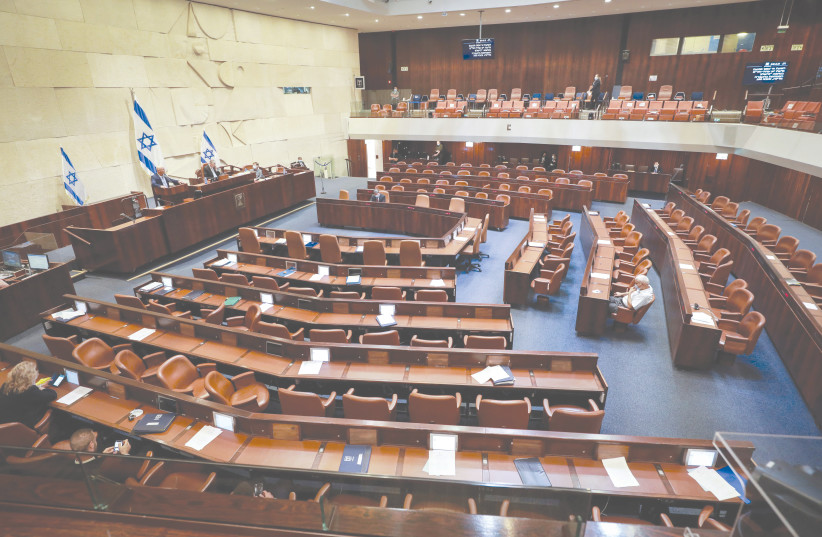Just as Jews around the world were putting away their etrogim at the end of Sukkot, Prime Minister Naftali Bennett engaged in a fruitless battle with healthcare professionals over the handling of the coronavirus.
The manufactured fight with the doctors appeared to be an unsuccessful attempt by Bennett to find an adversary to clash with when no other political rivals were both available and smart to attack at this point.
But if Bennett needs such conflicts to boost his leadership, there is good news ahead for him: There are many genuine political fights that are inevitable in the weeks and months ahead now that the Jewish holidays are over.
The holidays tend to be a relatively quiet time politically. The Knesset is not in session, there are fewer newspapers, and the MKs are busy arguing with their spouses and children at home instead of attacking each other on political battlefields.
That calm period will end Monday, when the Knesset returns from its recess. That day, Bennett and his predecessor, opposition leader Benjamin Netanyahu, will resume jousting in the Knesset plenum, with Netanyahu determined to respond to Bennett’s United Nations General Assembly address when the spotlight is back on him.

From then on, the Knesset will shift to full budget mode, with all hands on deck focused on the votes on the two-year state budget. Coalition chairwoman Idit Silman would like there to be no votes on any other bills for now, because key Knesset committees will have to be working around the clock on various parts of the budget bills.
The deadline to pass the budget into law is November 14, and in the unlikely scenario that it is not approved by then, there will be elections in February. But just in case there problems in passing the budget, the final votes on it have been set for 10 days earlier, on November 4, giving the coalition a 10-day buffer.
Between now and then, the eight parties in the coalition will try to obtain last-minute achievements, especially Ra’am (United Arab List), which must constantly justify joining the government to its voters and has yet to see any of the NIS 35 billion promised to the Arab sector.
When Silman and her aides are asked what happens after the budget, they react as though it were a question about life on Mars.
“We are looking at passing the budget and can’t look beyond it yet,” her spokesman said.
While understandable, that strategy may not be seen as the smartest in retrospect, because once the budget is passed, the parties in the coalition will feel unshackled and will start trying to implement their campaign promises.
Justice Minister Gideon Sa’ar will try to pass two separate bills preventing Netanyahu from forming another government, bills that are opposed by Interior Minister Ayelet Shaked. Shaked will try again to pass the Citizenship Law without Ra’am’s support.
Labor and Meretz leaders, who are upset that Bennett did not mention the Palestinians in his UN speech, will try to change the Finance Ministry’s map of preferred communities away from settlements, meet with Palestinian leaders and pass a Basic Law on Equality to balance out the Nation-State Law. Those moves would anger right-wing coalition MKs, who have their own pet bills helping Judea and Samaria.
Sa’ar supports another Basic Law on Legislation that would alter how constitutional changes are made, in an effort to stop one leader from upsetting the government’s checks and balances. He will also begin the sensitive process of selecting an attorney-general and Supreme Court judges.
Matters of religion and state will also dominate the headlines, starting with the kosher certification reform that is part of the budget’s economic arrangements bill. If Religious Services Minister Matan Kahana succeeds in passing it, bills on conversion and drafting yeshiva students await. He has said he would deal with the fate of egalitarian prayer at the Western Wall following the budget’s passage as well.
Security tensions with Hamas or Hezbollah could pressure Ra’am to leave the coalition, as could a continued escalation of violence among Israeli-Arabs.
The petty battle over the makeup of Knesset committees is not over yet. Knesset House Committee chairman Nir Orbach (Yamina) made another offer to Likud faction chairman Yariv Levin on Thursday which Levin rejected. The dispute is expected to be decided by the Supreme Court.
But the most divisive issue will remain the one that should be what unites Israelis: the real war against the coronavirus.
When the MKs return on Monday, there will be a no-confidence vote in the Knesset on the government’s “mismanagement” of COVID-19 which could prove embarrassing for Bennett. Following his fight with top doctors and a day after the first meeting of the coronavirus cabinet in more than a month, sparks are expected to fly.
Only if Bennett passes all those tests will he be able to keep his coalition together until the fall holidays finally come back next year.
